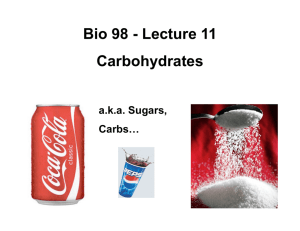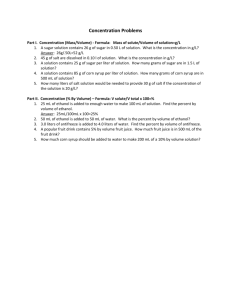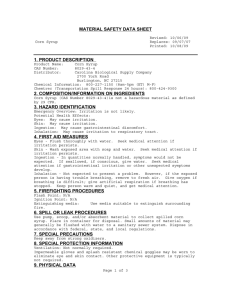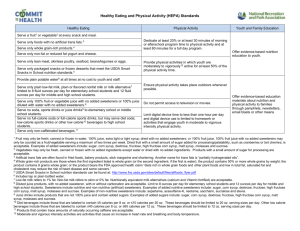Is Fructose Really the Enemy
advertisement
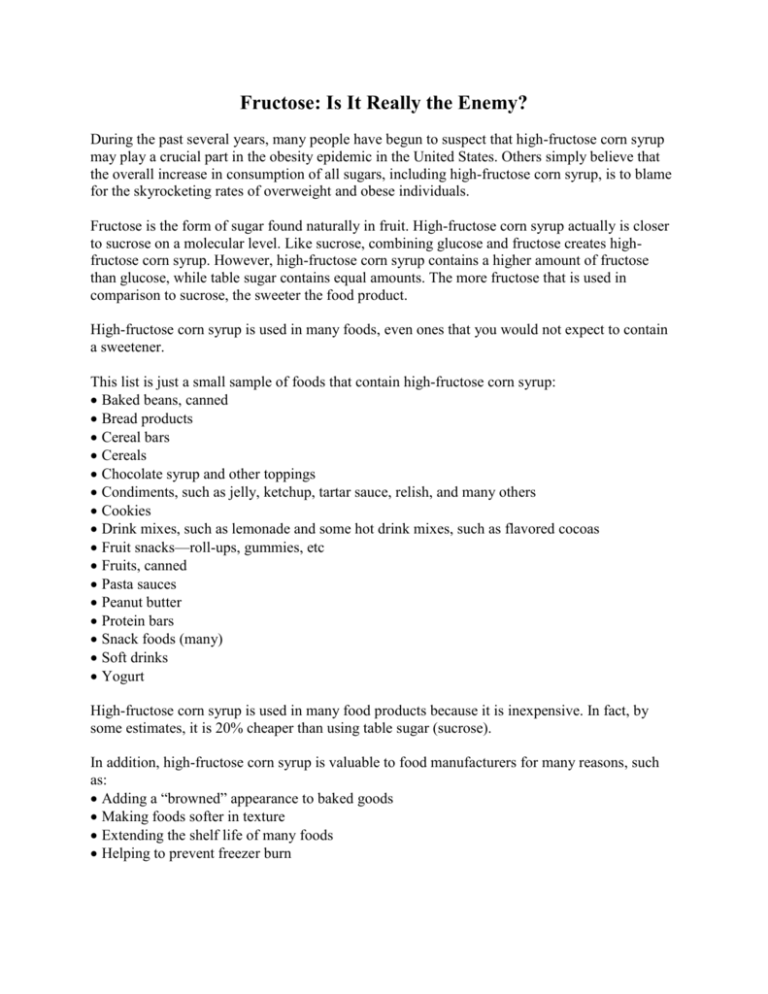
Fructose: Is It Really the Enemy? During the past several years, many people have begun to suspect that high-fructose corn syrup may play a crucial part in the obesity epidemic in the United States. Others simply believe that the overall increase in consumption of all sugars, including high-fructose corn syrup, is to blame for the skyrocketing rates of overweight and obese individuals. Fructose is the form of sugar found naturally in fruit. High-fructose corn syrup actually is closer to sucrose on a molecular level. Like sucrose, combining glucose and fructose creates highfructose corn syrup. However, high-fructose corn syrup contains a higher amount of fructose than glucose, while table sugar contains equal amounts. The more fructose that is used in comparison to sucrose, the sweeter the food product. High-fructose corn syrup is used in many foods, even ones that you would not expect to contain a sweetener. This list is just a small sample of foods that contain high-fructose corn syrup: Baked beans, canned Bread products Cereal bars Cereals Chocolate syrup and other toppings Condiments, such as jelly, ketchup, tartar sauce, relish, and many others Cookies Drink mixes, such as lemonade and some hot drink mixes, such as flavored cocoas Fruit snacks—roll-ups, gummies, etc Fruits, canned Pasta sauces Peanut butter Protein bars Snack foods (many) Soft drinks Yogurt High-fructose corn syrup is used in many food products because it is inexpensive. In fact, by some estimates, it is 20% cheaper than using table sugar (sucrose). In addition, high-fructose corn syrup is valuable to food manufacturers for many reasons, such as: Adding a “browned” appearance to baked goods Making foods softer in texture Extending the shelf life of many foods Helping to prevent freezer burn Link between high-fructose corn syrup and obesity In the past 30 years, use of high-fructose corn syrup in our food supply has increased by more than 1000%. At the same time the obesity epidemic in the United States continues to grow, with an estimated 69% of adults now overweight or obese. It is believed that much of this increase is related to Americans increasing their intake of soft drinks, highly processed food products, and fast food. Epidemiological evidence suggests that high-fructose diets, including those from sweetened beverages, may contribute to obesity and other health conditions, such as metabolic syndrome. Ghrelin is a hormone that is responsible for increasing hunger and appetite. Some studies have shown that after ingesting fructose, humans show an increase in their ghrelin output. Some scientists believe that fructose does not cause fullness or satiety in the same way that other sugars and carbohydrates do, so people eat more in an attempt to gain that level of satisfaction. In some animal studies, fructose is shown to stimulate the appetite. Another hormone important to appetite control is leptin, which helps the brain to signal fullness, decreases appetite, and controls body weight. Leptin is released concurrently with insulin following a meal. Intake of fructose may decrease release of both leptin and insulin. Insulin is important to the long-term regulation of energy homeostasis and body adiposity. Many researchers are hesitant to place the blame for increasing obesity solely on high-fructose corn syrup, but instead blame diets that are high in all sugars, the increased intake of calories in any form, and the decreased physical activity of modern Americans. Most experts agree that more sound research is needed on the subject. Other health concerns Some professionals fear that many more people are intolerant to fructose than was originally believed. Malabsorption can lead to cramps, bloating, diarrhea, and other forms of gastrointestinal distress. By one estimate, up to 75% of healthy people have incomplete absorption of fructose, but absorption is improved when fructose and glucose are consumed together. Several studies completed on both animals and humans have shown that a high dietary intake of fructose leads to a higher level of blood triglycerides. In one study, this effect was more pronounced in men than women. As a result the American Heart Association® now recommends limiting daily fructose intake from added and naturally occurring fructose to 50 to 100 grams/day. In addition to obesity, all sugars are linked to an increase and dental caries, as well as an increase in diabetes and heart disease. People who consume a high-sugar diet tend to not eat as many healthy foods that contain important vitamins and minerals. In addition, fiber intake drastically decreases as sugar increases in the average diet. According to the US Food and Drug Administration, “high-fructose corn syrup is as safe for use in food as sucrose, corn sugar, corn syrup, and invert sugar.” References and recommended readings Bray GA. Energy and fructose from beverages sweetened with sugar or high-fructose corn syrup pose a health risk for some people. Adv Nutr. 2013;4(2):220-225. doi:10.3945/an.112.002816. Bray GA. Fructose and risk of cardiometabolic disease. Curr Atheroscler Rep. 2012;14(6):570578. doi:10.1007/s11883-012-0276-6. Bray GA, Popkin BM. Calorie-sweetened beverages and fructose: what have we learned 10 years later. Pediatr Obes. 2013;8(4):242-248. doi:10.1111/j.2047-6310.2013.00171.x. Decher N, Krenitsky JS. Medical nutrition therapy for lower gastrointestinal tract disorders. In: Mahan LK, Escott-Stump S, Raymond JL. Krause’s Food and the Nutrition Care Process. 13th ed. St Louis, MO: Elsevier Saunders; 2012:627. Miller M, Stone NJ, Ballantyne C, et al; American Heart Association Clinical Lipidology, Thrombosis, and Prevention Committee of the Council on Nutrition, Physical Activity, and Metabolism; Council on Arteriosclerosis, Thrombosis and Vascular Biology; Council on Cardiovascular Nursing; Council on the Kidney in Cardiovascular Disease. Triglycerides and cardiovascular disease: a scientific statement from the American Heart Association. Circulation. 2011;123(20):2292-2333. doi:10.1161/CIR.0b013e3182160726. Obesity and overweight. Centers for Disease Control and Prevention Web site. http://www.cdc.gov/nchs/fastats/overwt.htm. Updated November 21, 2013. Accessed April 15, 2014. Rippe JM, Angelopoulos TJ. Sucrose, high-fructose corn syrup, and fructose, their metabolism and potential health effects: what do we really know? Adv Nut. 2013;4(2):236-245. doi:10.3945/an.112.002824. Rizkalla SW. Health implications of fructose consumption: a review of recent data. Nutr Metab. 2010;7:82. doi:10.1186/1743-7075-7-82. Review Date 4/14 G-0929


